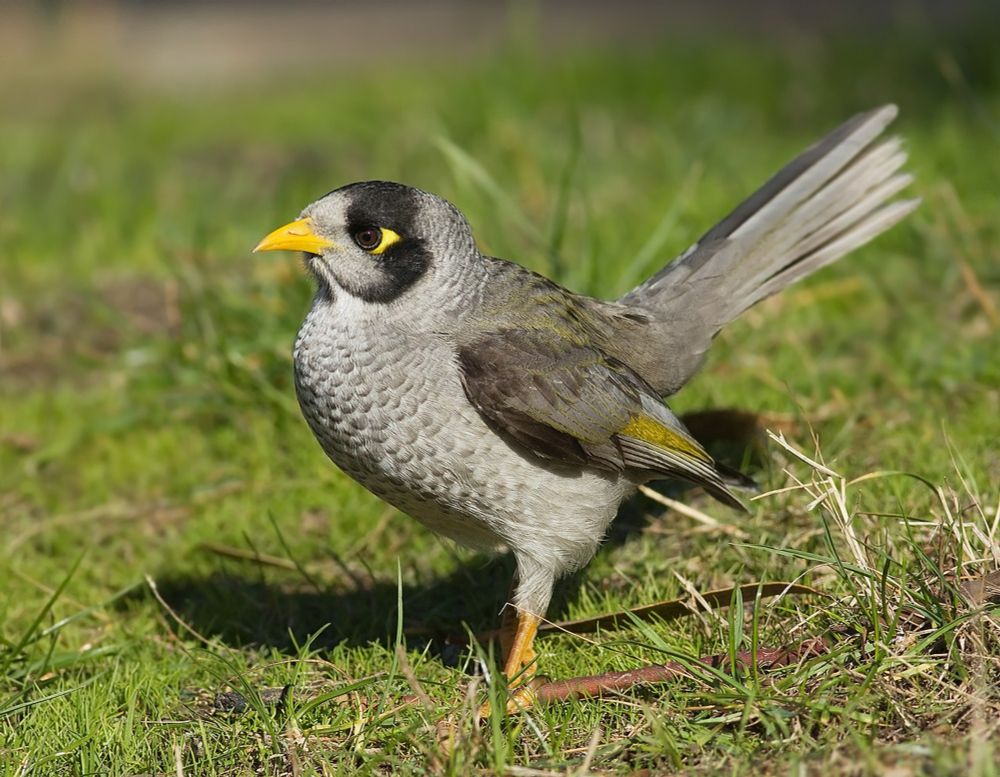
Empowering Water Decisions: Practical Guidance for Climate-Driven Hydrological Projections
A guide that helps in making hydrological projections more useful to multiple stakeholders.
bit.ly/4o4ZFuk
@susbites.bsky.social
Writer, editor, storyteller Canberra, Australia conservation, sustainability, water & resilience https://sustainabilitybites.com/ & https://www.globalwaterforum.org/ There's no such thing as a free lunch

Empowering Water Decisions: Practical Guidance for Climate-Driven Hydrological Projections
A guide that helps in making hydrological projections more useful to multiple stakeholders.
bit.ly/4o4ZFuk

Dbytes #690 (8 Oct 2025)
News in environmental decision making
1. Mapping Renewables for Nature
2. The Planetary Health Check 2025
3. Aboriginal ponds, implications for wetland stewardship
4. Water scarcity in the Anthropocene
And more
bit.ly/48gpvad
![Sydney’s Olympic Park was one of Australia’s biggest restoration works transforming some 800 hectares of contaminated industrial land into a set of functional, naturalistic ecosystems within an urban parkland environment. The process began before the 2000 Olympics and continues today. How can a study be designed to take into account both social and ecological systems (Image of restored wetlands adjacent to the Olympic stadia by David Salt) [See item 4]
Dbytes is a weekly eNewsletter presenting news and views on biodiversity conservation and environmental decision science. ‘D’ stands for ‘Decision’ and refers to all the ingredients that go into good, fair and just decision-making in relation to the environment.](https://cdn.bsky.app/img/feed_thumbnail/plain/did:plc:hltm2qkn4l2dwm2yaomflp4b/bafkreidrynnjslhnhyd2i7ziffibmlvoslzpjmycab6iz57dbvc6sjrnha@jpeg)
Sydney’s Olympic Park was one of Australia’s biggest restoration works transforming some 800 hectares of contaminated industrial land into a set of functional, naturalistic ecosystems within an urban parkland environment. The process began before the 2000 Olympics and continues today. How can a study be designed to take into account both social and ecological systems (Image of restored wetlands adjacent to the Olympic stadia by David Salt) [See item 4] Dbytes is a weekly eNewsletter presenting news and views on biodiversity conservation and environmental decision science. ‘D’ stands for ‘Decision’ and refers to all the ingredients that go into good, fair and just decision-making in relation to the environment.
Dbytes #689 (1 Oct 2025)
News in environmental decision making
1. The fate of modern civilisation
2. Wild bird numbers freefall in the UK
3. Truck spills: A threat to aquatic life
4. Designing research for ecosystem restoration
And more
bit.ly/46tZVNA

Truck spills: A threat to aquatic life
Truck spills are an important threat to aquatic ecosystems in countries all around the world, yet it’s a problem that often doesn’t receive the attention it deserves.
bit.ly/42FmA7e
![In an era where rivers are no longer just lifelines but instruments of power, South Asia stands at the brink of a water-driven geopolitical shift. With unilateral suspension of water treaties and renewed push for mega-dam projects, the region is entering a dangerous phase of hydro-coercion — where control over water becomes a strategic weapon, threatening the stability of millions and reshaping the landscape of global water diplomacy. [See item 1] (View of Indus river near Skardu. Image by Akbar Khan Niazi, This file is licensed under the Creative Commons Attribution-Share Alike 4.0 International license.)
The Delta is the fortnightly newsletter of the Global Water Forum.
It's free and you can sign up for it at https://globalwaterforum.org/the-delta/
and follow us on Twitter at @GWFWater or at Blue Sky at @susbites.bsky.social](https://cdn.bsky.app/img/feed_thumbnail/plain/did:plc:hltm2qkn4l2dwm2yaomflp4b/bafkreiffjx44h3oqbxggzhbr5cuho4axi6zm2nnaflcepulj7tnprjazam@jpeg)
In an era where rivers are no longer just lifelines but instruments of power, South Asia stands at the brink of a water-driven geopolitical shift. With unilateral suspension of water treaties and renewed push for mega-dam projects, the region is entering a dangerous phase of hydro-coercion — where control over water becomes a strategic weapon, threatening the stability of millions and reshaping the landscape of global water diplomacy. [See item 1] (View of Indus river near Skardu. Image by Akbar Khan Niazi, This file is licensed under the Creative Commons Attribution-Share Alike 4.0 International license.) The Delta is the fortnightly newsletter of the Global Water Forum. It's free and you can sign up for it at https://globalwaterforum.org/the-delta/ and follow us on Twitter at @GWFWater or at Blue Sky at @susbites.bsky.social
The Delta #91 (25 Sep 2025)
GWF news from the wide world of water
1. Weaponizing Rivers? The Indus Water Treaty Verdict
2. Accounting for water-related ecosystem services
3. Floods in the Podgorica-Skadar Basin, Montenegro
4. Global water scarcity in the Anthropocene
and more
bit.ly/46yxBIE

Wild bird numbers continue to fall in UK with some species in ‘dramatic freefall’
The most nature depleted country in the world continues to wage a savage war against nature in pursuit of the God of more economic growth no matte what the cost
www.theguardian.com/environment/...

Dbytes #688 (24 Sep 2025)
News in environmental decision making
1. Implementing Aust's Strategy for Nature
2. Fire & threatened species on Aust islands
3. Air is humming with insects but we’re blind to what’s happening to them
4. Climate risks report paints grim picture
& more
bit.ly/3Kk89za

Floods in the Podgorica-Skadar Basin, Montenegro
Climate change is making the future increasingly uncertain for the people living in this the Podgorica-Skadar Basin in Montenegro.
bit.ly/46sx235

Dbytes #687 (17 Sep 2025)
News in environmental decision making
1. Ridge-to-reef marine policy & natural capital accounting
2. Measuring our reliance on nature
3. Sacred Groves protecting Nature
4. Koalas on Australian Islands
And more
bit.ly/4ppt2sD

Weaponizing Rivers? The Indus Water Treaty Verdict and the Limits of Power
Indias’ threats to exit the Indus Waters Treaty has created enormous uncertainty around the use of the Indus River Basin, a region that supports more than 300 million people.
bit.ly/4giK8V7

We’re still not measuring our reliance on nature as we rush to boost productivity
The government’s goals were to make the economy more productive and resilient and the budget more sustainable. The health of our natural capital underpins all of these.
bit.ly/4pntqIs

Dbytes #686 (10 Sep 2025)
News in environmental decision making
1. Wetland conservation in the MDB
2. Merchants of doubt are back
3. Great Southern Reef monitoring program needed
4. Strategic management of noisy miners
And more
bit.ly/4mYumRT

The Delta #90 (9 Sep 2025)
GWF news from the wide world of water
1. The increasing-block water pricing policy in China
2. The State of American Water Infrastructure
3. Can Trust Flow Again in South Asia’s Shared Rivers?
4. Kenya hit by severe drought
and more
bit.ly/46tSvd2

Household misperceptions on water price threaten the effectiveness of the increasing-block water pricing policy in China
In an effort to reduce domestic water consumption, consumers pay more for water when consumption exceeds certain thresholds
bit.ly/4m0Ztem
![On Monday, the Commonwealth Environmental Water Holder announced a pause on all environmental water flows in NSW. A member of the Macquarie Environmental Water Advisory Group says if the Macquarie Marshes does not receive its planned environmental water release, there will be damage to wetlands, wildlife and vegetation. [See item 3] [Image of a healthy Macquarie Marsh by Cameron Muir - Flickr:marshes healthy, CC BY-SA 2.0, https://commons.wikimedia.org/w/index.php?curid=11273527]
Dbytes is a weekly eNewsletter presenting news and views on biodiversity conservation and environmental decision science. ‘D’ stands for ‘Decision’ and refers to all the ingredients that go into good, fair and just decision-making in relation to the environment.](https://cdn.bsky.app/img/feed_thumbnail/plain/did:plc:hltm2qkn4l2dwm2yaomflp4b/bafkreicgpeaqogyury7ao4s6ojn47mfy2vyh6viwpgaiwj33zliiooj25i@jpeg)
On Monday, the Commonwealth Environmental Water Holder announced a pause on all environmental water flows in NSW. A member of the Macquarie Environmental Water Advisory Group says if the Macquarie Marshes does not receive its planned environmental water release, there will be damage to wetlands, wildlife and vegetation. [See item 3] [Image of a healthy Macquarie Marsh by Cameron Muir - Flickr:marshes healthy, CC BY-SA 2.0, https://commons.wikimedia.org/w/index.php?curid=11273527] Dbytes is a weekly eNewsletter presenting news and views on biodiversity conservation and environmental decision science. ‘D’ stands for ‘Decision’ and refers to all the ingredients that go into good, fair and just decision-making in relation to the environment.
Dbytes #685 (3 Sep 2025)
News in environmental decision making
1. Expand or better manage protected areas
2. Managing Rediscovered Species
3. Halting all environmental water flows in NSW
4. Decolonize scientific institutions
And more
bit.ly/4gf9WkX

The Current State of American Water Infrastructure
There’s much that is positive, but also much in need of improvement including testing, maintenance timelines, more effort on lead pipes, more monitoring technologies and an upgrading of cyber security
bit.ly/4oVJ7pU
![The good ship ‘Environmental Reform’ has been sitting idle for decades. Now there are moves to cut red tape around development approvals and the talk is about speeding up environmental reforms. However, as Michael Vardon discusses in item 1, we need to be careful that such reforms don’t accelerate the loss of natural capital. [Image by David Salt]
Dbytes is a weekly eNewsletter presenting news and views on biodiversity conservation and environmental decision science. ‘D’ stands for ‘Decision’ and refers to all the ingredients that go into good, fair and just decision-making in relation to the environment.](https://cdn.bsky.app/img/feed_thumbnail/plain/did:plc:hltm2qkn4l2dwm2yaomflp4b/bafkreibkyjwtupxjb7hjqrmo3vmjsssmilkczl4nhv5zkdk6dtrmtfaqle@jpeg)
The good ship ‘Environmental Reform’ has been sitting idle for decades. Now there are moves to cut red tape around development approvals and the talk is about speeding up environmental reforms. However, as Michael Vardon discusses in item 1, we need to be careful that such reforms don’t accelerate the loss of natural capital. [Image by David Salt] Dbytes is a weekly eNewsletter presenting news and views on biodiversity conservation and environmental decision science. ‘D’ stands for ‘Decision’ and refers to all the ingredients that go into good, fair and just decision-making in relation to the environment.
Dbytes #684 (27 August 2025)
News in environmental decision making
1. Boost productivity but not at the cost of nature
2. Off-the-charts marine heat severely damages Ningaloo coral reefs
3. Dynamics of the polycrisis
4. Methods influence nature's values
And more
bit.ly/47g6GDy

Can Trust Flow Again in South Asia’s Shared Rivers?
Rather than working to make transboundary treaty arrangements more adaptive and climate resilient, current policies appear to be using them more as political weapons.
bit.ly/45q909G

The Delta #89 (20 Aug 2025)
GWF news from the wide world of water
1. Enhancing Urban Water Resilience in Seville
2. Data centers consume massive amounts of water
3. River Governance and Citizen Science
4. Colorado River slowly dries up
and more
bit.ly/3JmiBFW

Despite claims last year by then-environment Minister Tanya Plibersek that she was approving wind farms at ‘the fastest rate in history’, a recent analysis published by a big law firm claims that none of the 76 renewables projects referred for EPBC approval in 2023 and 2024 across 3 states had received final approval. (Image by Rudy and Peter Skitterians from Pixabay)(See item 3). Dbytes is a weekly eNewsletter presenting news and views on biodiversity conservation and environmental decision science. ‘D’ stands for ‘Decision’ and refers to all the ingredients that go into good, fair and just decision-making in relation to the environment.
Dbytes #683 (20 August 2025)
News in environmental decision making
1. Indigenous knowledge saving great desert skink
2. Environment groups call for greater input into economic roundtable
3. Need for approvals speed
4. Global plastics treaty fail
And more
bit.ly/3Uy2Cab

Sustainability Bites seeks to engage you with the multiple dimensions and consequences of sustainability (and sustainable development), particularly those concerned with finding the right long-term accommodation between environment and development. We believe there is no such thing as a free lunch. Banner image: Despite claims last year by then-environment Minister Tanya Plibersek that she was approving wind farms at ‘the fastest rate in history’, a recent analysis published by a big law firm claims that none of the 76 renewables projects referred for EPBC approval in 2023 and 2024 across 3 states had received final approval. (Image by Rudy and Peter Skitterians from Pixabay)
More need for speed: can we squeeze a little more out of the old EPBC Jalopy?
Use EPBC powers to appoint commissioners to assess proposed renewable energy projects by inquiry
bit.ly/45nH5ar

Combined Strategies to Enhance Urban Water Resilience in Seville
3 common polices involve fixing leaks, raising awareness among consumers & putting up prices. How do you evaluate the effectiveness of such policies, especially when they interact?
bit.ly/3H9rQbW
![People’s connection to nature has declined by more than 60% since 1800. Levels of nature connectedness will continue to decline unless there are far-reaching policy and societal changes – with introducing children to nature at a young age and radically greening urban environments the most effective interventions. [See item 1] Pictured are visitors enjoying nature’s splendor at Edith Falls on the Edith River in the Nitmiluk National Park, Northern Territory (Image by David Salt)
Dbytes is a weekly eNewsletter presenting news and views on biodiversity conservation and environmental decision science. ‘D’ stands for ‘Decision’ and refers to all the ingredients that go into good, fair and just decision-making in relation to the environment.](https://cdn.bsky.app/img/feed_thumbnail/plain/did:plc:hltm2qkn4l2dwm2yaomflp4b/bafkreic3ciel2hsydvukqhkhh5sbytewcwv34kqgiscdbvglmftkapd7ju@jpeg)
People’s connection to nature has declined by more than 60% since 1800. Levels of nature connectedness will continue to decline unless there are far-reaching policy and societal changes – with introducing children to nature at a young age and radically greening urban environments the most effective interventions. [See item 1] Pictured are visitors enjoying nature’s splendor at Edith Falls on the Edith River in the Nitmiluk National Park, Northern Territory (Image by David Salt) Dbytes is a weekly eNewsletter presenting news and views on biodiversity conservation and environmental decision science. ‘D’ stands for ‘Decision’ and refers to all the ingredients that go into good, fair and just decision-making in relation to the environment.
Dbytes #682 (13 August 2025)
News in environmental decision making
1. Human connection to nature declines
2. The perfect toolbox
3. Extreme heat wiping out tropical birds
4. Murray–Darling Basin Plan Evaluation
And more
bit.ly/4mDtcKT

Sustainability Bites seeks to engage you with the multiple dimensions and consequences of sustainability (and sustainable development), particularly those concerned with finding the right long-term accommodation between environment and development. We believe there is no such thing as a free lunch. Banner image: Next time you decide to build a toolbox for your home or design a food system to feed humanity, be careful aiming for perfection via the pathway of efficiency. You might be optimal for a little while, but then the world turns and you’ll discover you’ve naively placed all your eggs in one basket. (Image by VintageSnipsAndClips from Pixabay)
The perfect toolbox (doesn’t exist)
Next time you decide to build a toolbox for your home or design a food system to feed humanity, be careful aiming for perfection via the pathway of efficiency. It's like putting all your eggs in one basket.
bit.ly/4mwSRVw

River Governance and Citizen Science: Towards a New Cartography of Urban Rivers
A theoretical and methodological approach to urban water management that emphasizes citizen science and community engagement
bit.ly/4m5Rg9B

A Wallum sedge frog (Litoria olongburensis) from south-east Queensland, a species not known to be impacted by chytrid fungus, but which has suffered declines during periods of severe drought. (Image credit: Geoffrey Heard, see item 1) Dbytes is a weekly eNewsletter presenting news and views on biodiversity conservation and environmental decision science. ‘D’ stands for ‘Decision’ and refers to all the ingredients that go into good, fair and just decision-making in relation to the environment.
Dbytes #681 (7 August 2025)
News in environmental decision making
1. A Threatened Frog Index for Australia
2. Sharp decline in Great Barrier Reef after heatwave
3. Earth’s Wetlands Are Disappearing
4. Giant cuttlefish aggregation at risk from algal bloom
And more
bit.ly/4mxf3iu

Our image: A Fleay’s barred frog (Mixophyes fleayi) from the Springbrook plateau, south-east Queensland. Populations of this species have grown markedly over the past two decades, and the species has even recolonised locations from which it was extirpated by the chytrid fungus. (Image credit: Geoffrey Heard.) The Delta is the fortnightly newsletter of the Global Water Forum. It's free and you can sign up for it at https://globalwaterforum.org/the-delta/ and follow us on Twitter at @GWFWater or at Blue Sky at @susbites.bsky.social
The Delta #88 (6 Aug 2025)
GWF news from the wide world of water
1. A Threatened Frog Index for Australia
2. Unprecedented loss of freshwater across the planet
3. Combatting Groundwater Overdraft in China
4. Water Justice Day 2025
and more
bit.ly/3J5GgKt

Water Justice Day 2025
The change that is desperately needed is active listening to communities so that prioritisation of investments and water allocations do not happen without affected communities having their voices heard
bit.ly/3UBL6l9

During a recent assessment of the conservation status of Australian reptiles, one in five threatened species were not represented in a single protected area, with many threatened species restricted to private property in agricultural landscapes or known only from single locations. One approach to countering the negative impacts of agricultural expansion and intensification is through ecological restoration. However, reptiles are rarely considered in restoration programs. See item 1 (Image by David Salt). Dbytes is a weekly eNewsletter presenting news and views on biodiversity conservation and environmental decision science. ‘D’ stands for ‘Decision’ and refers to all the ingredients that go into good, fair and just decision-making in relation to the environment.
Dbytes #680 (30 July 2025)
News in environmental decision making
1. Conserving reptiles in Aust agricultural landscapes
2. Let’s TOC - Less Theory, More Change
3. Africa’s freshwater fish face a crisis
4. Conservation auctions for landscape-scale environmental management
And more
bit.ly/4mkgxfU

Let’s TOC - Less Theory, More Change, Better Democracy
Some believe TOC is a distraction to efforts to change how democracy is practiced if we are to effectively mitigate climate change
bit.ly/40CWelw